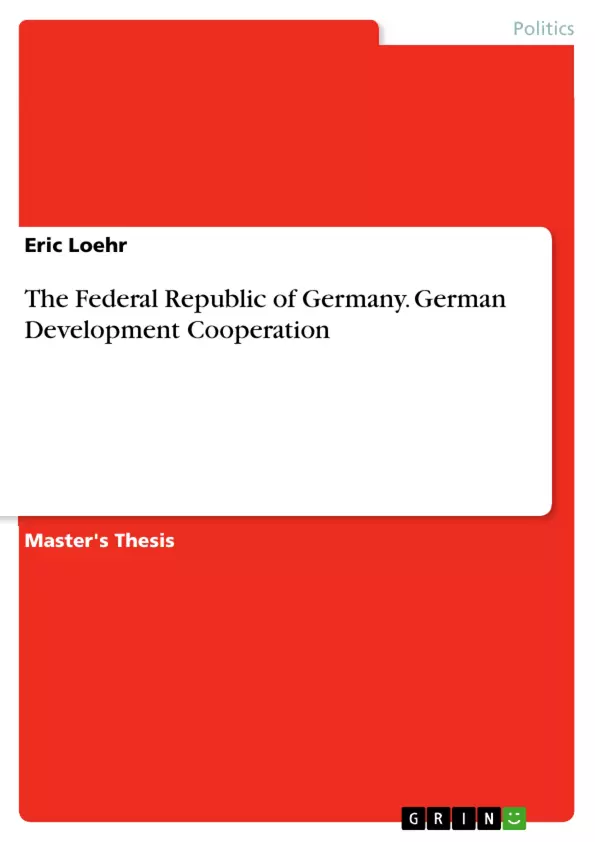This master's thesis aims to expand the state of research by examining federal-state cooperation in the context of international DC. To this end, the policy field will first be described in terms of its institutional structure. Multi-level governance research as a sub- discipline of political science serves as the theoretical basis for classifying the system. Furthermore, the discussion of governance forms, as well as their opportunities and risks, serves as an in-depth description of the relationships between the actors of the system. To contextualise the framework, the theory of federalism is used. In this way, the influence of the prevailing political system can be considered. The FSP is used as a case study so that the impact of federal-state cooperation on state DC can be determined. At the time of this research report, no evaluation reports of the FSP exist. It is important to mention that the entire multi-level system is examined so that a possible conceptual deficiency can be counteracted, and no analytical gap arises.
The focus of the paper is thus on the following question: To what extent does the multi-level system influence the performance of state development cooperation in the Federal Republic of Germany?
The policy field of Development cooperation in Germany is subject to constant review of projects, with system-oriented studies on the decentralisation of the multi-level system being conducted in addition to content-specific impact studies. In this context, Groß analyses the impact of the multi-stakeholder approach, which is enshrined in the Sustainable Development Goals. The results show that the inclusion of all relevant stakeholders from politics, civil society and the private sector has a positive impact on the effectiveness and sustainability of decentralisation forms. The study underlines the importance of integrating all actors in a multi-level system. Consequently, it is noticeable that the state of research on federal-state cooperation in German DC is limited. Bohnet et al. discuss the structure of German DC in 2018. While the federal ministries involved are considered in detail, the representation of the federal states can be classified as marginal. Herrmanns examines the challenges of the German DC to be able to make recommendations for action for more efficiency.
Inhaltsverzeichnis (Table of Contents)
- 1 Introduction
- 1.1 Research Objective
- 1.2 Structure and Procedure
- 2 Theoretical backgrounds
- 2.1 Multi-level Governance
- 2.1.1 Types of Multi-level Governance
- 2.1.2 Coordination Mechanisms
- 2.1.3 Coordination Dilemma
- 2.1.4 Analysis Tool: Performance Indicator
- 2.2 The Federal System of the Federal Republic of Germany
- 2.2.1 Institutional Framework
- 2.2.2 Vertical and horizontal cooperation
- 2.2.2.1 Vertical cooperation
- 2.2.2.2 Horizontal cooperation
- 2.2.3 Policy linkage
- 2.2.3.1 Joint tasks and mixed financing
- 2.2.3.2 Ministerial conferences and administrative cooperation
- 2.3 Multi-Level Development Cooperation in Germany
- 2.3.1 Development Cooperation in Germany
- 2.3.2 Institutional Mapping of governmental Development Cooperation
- 2.3.2.1 Federal Ministry for Economic Cooperation and Development
- 2.3.2.2 The Society for International Cooperation
- 2.3.2.3 Reconstruction Loan Corporation
- 2.3.3 Case study: Federal-State- Program
- 2.3.4 Policy linkages in Development Cooperation
- 2.3.4.1 Joint tasks and mixed financing
- 2.3.4.2 Ministerial conferences and administrative cooperation
- 3 Methodology
- 3.1 Research Design
- 3.2 Research Goal
- 3.3 Data collection
- 3.3.1 Guided expert interviews
- 3.3.2 Sampling procedure and selection of experts
- 3.3.3 Presentation of the interview guide
- 3.4 Implementation of the methods
- 3.5 Data evaluation
- 3.5.1 Category system
- 3.5.2 Multi-Level- Governance Power Indicator
- 4 Presentation of the results
- 4.1 Background information
- 4.2 General: Coordination in the multi-level- development system
- 4.3 Process
- 4.4 Content
- 5 Discussion
- 5.1 Summary of the presentation of results
- 5.2 Interpretation of the results
- 5.3 Evaluation of the Multi-level DC
- 5.4 Limitation of Research
Zielsetzung und Themenschwerpunkte (Objectives and Key Themes)
This Master's thesis aims to provide a comprehensive analysis of the Federal Republic of Germany's development cooperation within a multi-level governance framework. The study seeks to understand the intricate interactions and coordination mechanisms between different levels of government in shaping and implementing development policies.
- Multi-level governance and its application to development cooperation in Germany.
- The institutional framework and coordination mechanisms within the German federal system.
- The role of vertical and horizontal cooperation in development policy.
- The impact of policy linkages on development cooperation initiatives.
- The effectiveness and challenges of multi-level development cooperation in Germany.
Zusammenfassung der Kapitel (Chapter Summaries)
- Chapter 1: Introduction
- This chapter introduces the research topic, outlines the research objectives, and establishes the structure and methodology employed in the study.
- Chapter 2: Theoretical Backgrounds
- This chapter delves into the theoretical frameworks underpinning the research, focusing on multi-level governance, the German federal system, and development cooperation in Germany.
- Chapter 3: Methodology
- This chapter presents the research design, data collection methods, and data evaluation procedures used in the study. It outlines the use of guided expert interviews and the development of a multi-level governance power indicator.
- Chapter 4: Presentation of Results
- This chapter presents the findings of the research, analyzing the coordination mechanisms and processes involved in the multi-level development cooperation system in Germany.
- Chapter 5: Discussion
- This chapter summarizes the main results, interprets the findings, and evaluates the effectiveness of multi-level development cooperation in Germany. It also identifies the limitations of the research.
Schlüsselwörter (Keywords)
The key terms and concepts explored in this thesis include multi-level governance, development cooperation, federalism, institutional framework, coordination mechanisms, policy linkages, expert interviews, and multi-level governance power indicator.
- 2.1 Multi-level Governance
- Quote paper
- Eric Loehr (Author), 2023, The Federal Republic of Germany. German Development Cooperation, Munich, GRIN Verlag, https://www.grin.com/document/1453223



